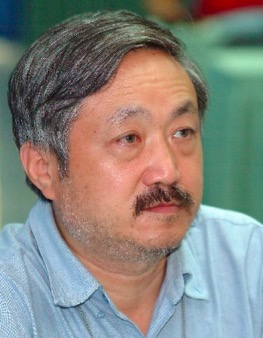Rong-Qiao He

Rong-Qiao He, Ph.D.
Professor, State Key Laboratory of Brain and Cognitive Science
Institute of Biophysics, Chinese Academy of Sciences.
Education
He graduated from Luzhou Medical College in Sichuan province in 1982; defended for M.S. in the department of Cytology of Institute of Microbiology, Chinese Academy of Sciences (CAS) in 1989, and obtained Ph. D (Enzymology) in the National laboratory of Biomacromolecules, Institute of Biophysics CAS. Now, he works in the State Key Laboratory of Brain and Cognitive Science, Institute of Biophysics (CAS).
Work experience
He works on protein folding and neurodegeneration. His group studies protein posttranslational modification, misfolding, aggregation and neurodegeneraiton with aldehyde compounds. He has visited and cooperatively worked with the colleagues in Dept of Biochemistry University of Cambridge, UK; Collagen Research group Division of Molecular and cellular biology, Bristol University, UK; Dept of Pharmacy, University of Nottingham, UK; Lady Davis institute for Medical Research, McGill University, Canada; Dept of Biophysics and Biochemistry, Pisa University, Italy; and Dept Neurochemistry, the State Institute of Basic Research of Disabilities, New York, USA.
Research Interests:
We are interested in the exogenous and endogenous aldehydes such as formaldehyde and how the aldehydes play a role in the age-related cognitive impairments (Pre-MCI, MCI and Alzheimer disease). We attempt to clarify the mechanism of aldehyde-induced cognitive impairment; to establish aldehyde-induced cognitive impaired animal models including mouse, rat and monkey; and to design a new chemical method for diagnosis of age-related cognitive impairments and also epidemiological investigation with endogenous formaldehyde. In addition, this group also studies some microRNA involved in eye and brain development.
Five representative publications:
1. Yan Wei, Chanshuai Han, Yujing Wang, Beibei Wu, Tao Su, Ying Liu, Rongqiao He. Ribosylation triggering Alzheimer’s disease-like Tau hyperphosphorylation via activation of CaMKII. Aging Cell, 2015;14(5):754-63.
2. BeiBei Wu, Yan Wei, YuJing Wang, Lei Zhou, Tao Su, Ying Liu, Rongqiao He. Gavage of D-Ribose induces Aβ-like deposits, Tau hyperphosphorylation as well as memory loss and anxiety-like behavior in mice. Oncotarget, 2015, 6(33): 34131-342142.
3. Zhiqian Tong, Chanshuai Han, Min Qiang, Weishan Wang, Jihui Lv, Shouzi Zhang, Wenhong Luo, Hui Li, Hongjun Luo, Jiangning Zhou, Beibei Wu, Tao Su, Xu Yang, Xiaomin Wang, Ying Liu, Rongqiao He,Age-related formaldehyde interferes with DNA methyltransferase function on causing memory loss in Alzheimer’s disease. Neurobiol Aging, 2015, 36(1):100-110.
4. Chanshuai Han, Yang Lu, Yan Wei, Ying Liu, Rongqiao He. (2014) D-Ribosylation induces cognitive impairment through RAGE-dependent astrocytic inflammation. Cell Death Dis, 5, e1117; doi:10.1038/cddis.2014.89.
5. Kaili Liu, Ying Liu*, Weichuan Mo, Rong Qiu, Xiumei Wang, Jane Y. Wu and Rongqiao He* (2011) MiR-124 regulates early neurogenesis in the optic vesicle and forebrain targeting NeuroD1 Nucleic Acid Research,39 (7): 2869-2879.
Awards and Honors:
➢ The progress prize of Science and Technology, the first-rate, Chinese Academy of Sciences (1995).

